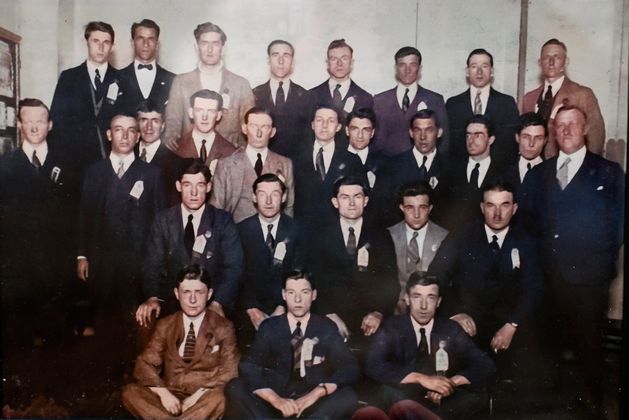The FAI recognises the 1924 Olympic Games matches as the first men’s international fixtures. Pictured is the team photo of the 1924 Republic of Ireland Olympic Games team at Castleknock Hotel in Dublin
Ireland’s first ever football players were honoured at an event in Dublin today which marked the reclassification of four 1924 fixtures as full internationals.
Earlier this month, the FAI announced that they were formally recognising Ireland’s meeting with Bulgaria at the 1924 Olympic games as the team’s first senior international men’s match.
That 1-0 victory in Paris, as well as three further fixtures that year, have now been officially recognised as the side’s first games following a campaign by a committee which included football historian Gerry Farrell and TD Aodhán Ó Ríordáin.
Relatives of the 1924 players were hosted at an event to mark the milestone on Monday, and will also be invited to Ireland’s Lansdowne Road friendly against Hungary next week where each family will be presented with a commemorative cap and presented to the home crowd.
“It’s been a team effort. Now, the win over Bulgaria was our first full match and Paddy Duncan was our first goalscorer. I’m delighted they have been recognised,” Farrell told the Irish Independent.
“It’s a lovely 100-year symmetry with the Olympics also being in Paris this year. The 1924 games was the biggest international football tournament up until the 1982 World Cup, which is crazy when you think about it.
“Twenty-two nations competed, one of which was Uruguay, who would go on to win the first ever World Cup in 1930. So this was a big deal. These Irish players did it with very little support and had to fundraise themselves. They are also our first Olympians, as well as our first internationals, so it’s really important to recognise them.”
The four games were initially considered as full senior internationals until the 1960s, when FIFA re-classified the 1924 matches as amateur games.
“Most of the players would have died thinking they were part of the first international team, they were given caps,” added Farrell.
“In 1999, FIFA ruled that each nation could decide whether they wanted to reclassify them. You see how much it means to the family members, that their great grandfathers or whoever it might be, are being recognised. So many people have brought photographs and other memorabilia which have been kept in the family for a century. There is the written history, but then there is also the oral history which is passed down through the family. It’s great to tap into that and hear their stories – that these players are not just names on a page.”

